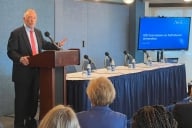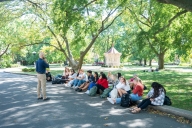You have /5 articles left.
Sign up for a free account or log in.
Eastern Mennonite University could be the first Mennonite institution to formally reverse its policy prohibiting tenure-line faculty from pursuing same-sex relationships. On Monday, President Loren Swartzendruber announced a six-month “listening period" on the policy to involve students, faculty and staff. During the review process, faculty will not be penalized for violating the policy, meaning some professors in same-sex relationships could keep their jobs or be hired. The decision comes amid student and faculty calls for change and broader debates within the Mennonite Church on homosexuality.
“As a Christian university it is our responsibility to engage in community discussion and discernment over issues that Mennonite congregations – indeed almost all denominations in the United States today – are wrestling with,” Swartzendruber said during a forum for faculty and staff. The meeting followed a unanimous vote by the university’s Board of Trustees over the weekend in favor of a six-month policy review period, to begin in January. The board charged Swartzendruber with designing and carrying out the listening period.
In an interview, Swartzendruber said he didn’t yet have a formal plan for the policy review, but said that it would involve formal dialogues among and between students, faculty, staff and the administration. Although faculty members and students have for years advocated for a policy reversal, he said, formal study will help discern the extent of support for such a change on campus. Given the faith’s focus on social justice on one hand and its commitment to biblical values on the other, he said, there’s “tension” over homosexuality.
He stressed that any outcome is unknown, and although he’ll eventually present an opinion to the board, trustees will decide on the ultimate fate of the policy.
Still, faculty and alumni in favor of a policy reversal said the announcement was good news.
“I do believe we’re moving toward an acceptance policy,” said Mark Sawin, professor of history, noting the same-sex relationship prohibition was something he was concerned about when he began teaching at Eastern Mennonite in 2001. “But I believe we’ve been moving in this direction my entire time here.” The same goes for his Mennonite congregation, he said, which recently adopted a same-sex relationship acceptance policy.
Following a non-creedal tradition, Eastern Mennonite has less stringent faith-based requirements for its faculty than some other institutions of other denominations within the Council for Christian Colleges and Universities. Some, for example, require faculty to sign statements of faith that are detailed about particular denominational beliefs. During the interview process at Eastern Mennonite, tenure-line faculty candidates must discuss any objections they have to the church’s Confessions of Faith in a Mennonite Perspective, which defines marriage as a covenant for life between a man and a woman. And upon hire, faculty must sign the university’s Community Lifestyle Commitment condemning premarital sex. Historically, the university has distinguished between same-sex attractions and acts, meaning that a gay or lesbian faculty member who is celibate could be hired. Still, Swartzendruber said there’s some degree of self-selection that occurs before the hiring process, due to such policies. The faculty is more than 50 percent Mennonite.
The institution is in Virginia, where same-sex marriages are not recognized by the state.
Darian Harnish, a co-founder of the university’s Safe Space program for gay, lesbian, bisexual and transgender students who graduated in May, opposes Eastern Mennonite’s current policy. He said the lack of openly gay faculty role models on campus sends the wrong message to LGBT students, who – in a kind of disconnect – are generally accepted on campus.
“Many of my friends who have graduated from the university and gone on to pursue higher degrees really love the institution, but as openly gay men or women, have said, 'It will be a very long time before I can come back here and teach.' "
In addition to gay and lesbian faculty, Harnish said, the policy might also discourage straight faculty who disapprove of it from coming to Eastern Mennonite. Other faculty have disapproved of the policy as exercised; a professor resigned after two other professors were fired after engaging in what was reported as “homosexual behavior,” just before Swartzendruber assumed the presidency in 2004. (No faculty member has been dismissed for violating the policy during his presidency).
Sawin said that was a “complicated moment” in the university’s history, noting that the Faculty Senate was formed soon after the dismissals, partially in response. (The Faculty Senate president did not respond to a request for comment.) Today, however, Sawin said the faculty enjoys a good relationship with Swartzendruber and the rest of the administration, and there’s general confidence in his ability to execute a successful listening period.
In a news release, the board “reaffirms EMU’s relationship with Mennonite Church USA and its practice of biblical discernment in community.” It also reaffirmed ‘’EMU’s academic freedom policy,” which upholds the right of staff, faculty and administrators “to articulate their personal beliefs and values.”
The Council for Christian Colleges and Universities declined to comment on the announcement, as did Mennonite Church U.S.A.
As a history professor, Sawin noted Eastern Mennonite’s opportunity to lead on this issue, much as it led Southern institutions by graduating its first black student in 1954, even before the Brown v. Board of Education.
Harnish said he saw the rest of the academic year as an opportunity for Eastern Mennonite not to lead but to “model,” establishing effective means of debating issues at the core of the church today, and in the democratic Mennonite tradition.









